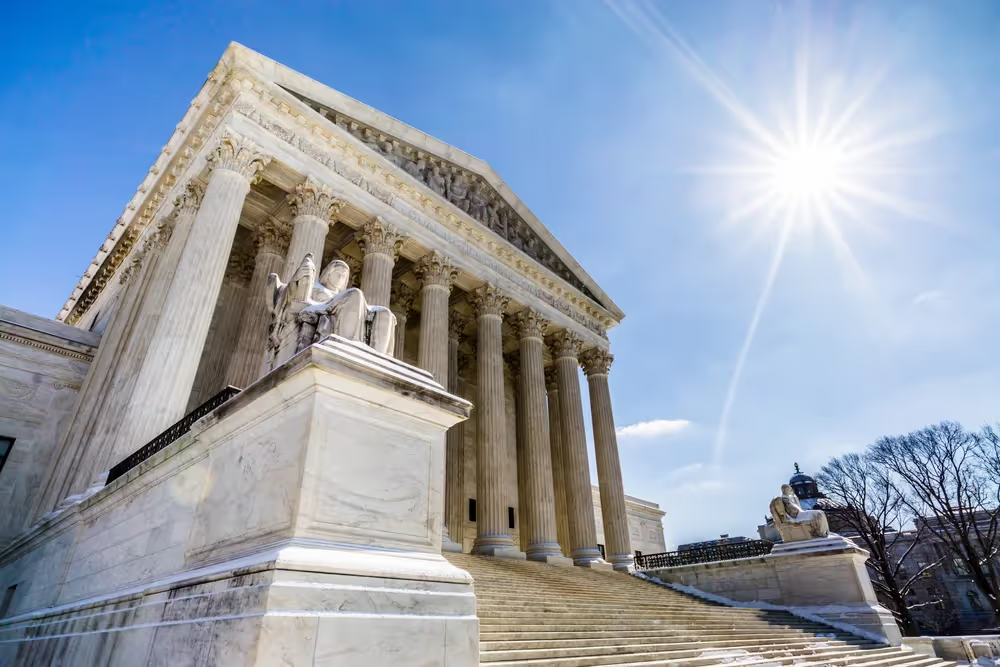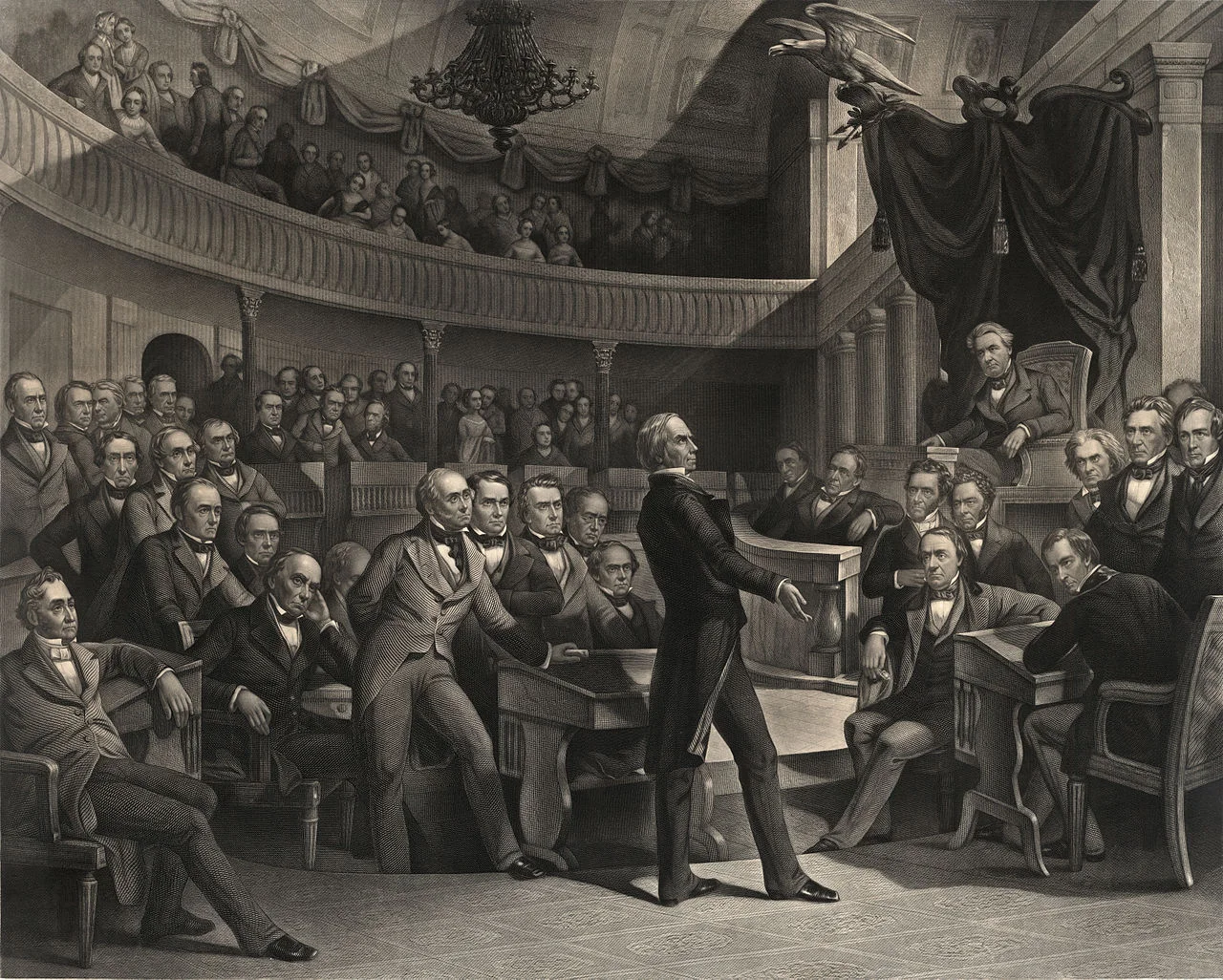
Mistaking Principle for Appeasement
Executive overreach does not justify judicial overreach—and it is hardly appeasement to conclude otherwise.
The Supreme Court’s failure to confront and rebuke the Trump Administration reflects a strategy of “appeasement,” and could produce equally disastrous results. So suggested Georgetown University law professor Steve Vladeck at a National Constitution Center recap of the Supreme Court’s term. In this telling, Chief Justice Roberts could be this century’s Neville Chamberlain, naively accommodating a looming fascist threat. However much the justices believe their restraint reflects prudence, Vladeck argued in a subsequent post, the Court’s accommodation of Trump Administration excesses may empower further lawlessness and threaten the rule of law.
This analysis proceeds from the assumption that the Court’s repeated grant of Trump Administration applications to stay or restrain district court injunctions have been a mistake, and were not legally justified, let alone compelled. From this standpoint, the best that can be said of the justices is that they are trying to avoid unnecessary or premature confrontations with the Executive Branch—confrontations the judiciary, possessing the power of neither the sword nor the purse, could well lose. The question, then, is at what point does prudence become appeasement?
This is an appealing take for the Trump Administration’s critics, particularly those with no fondness for the current Supreme Court, but it proceeds on some dubious assumptions about the legal merits of the questions the Court has confronted and the proper scope of the judicial power.
A much simpler explanation for the Court’s decisions is that the justices are doing their level best to resolve the legal questions before them in accordance with the law, cognizant of the limits of their own authority. While the justices have been stingy in offering explanations for decisions made on an expedited basis on the “shadow docket,” the rationales behind their actions are not hard to discern. Much as in Trump v. CASA, where the Court’s conservative majority held that district courts lack the equitable power to impose universal injunctions, the justices are resolving specific questions in the context of specific cases, rather than seeking to pronounce on the ultimate legality or wisdom of the executive branch’s initiatives.
The Court has not been asked to determine whether the Trump Administration is drawing within the lines and complying with federal law in every instance—and in many instances it is clear that it is not. Rather, the Court has been asked to rule on specific questions raised in specific cases, such as whether a district court correctly concluded that a particular action was unlawful, was properly before the court, or is even the sort of question that the judiciary can resolve. As Justice Barrett reminded us in her Trump v. CASA opinion, “federal courts do not exercise general oversight of the Executive Branch."
It has been black-letter law since the Founding that not every unlawful act has a remedy in federal court. (Just ask Wiliam Marbury.) Some cases present nonjusticiable political questions. In other cases, no plaintiff can satisfy the requirements of Article III standing. In still others, Congress may have channeled litigation to particular courts or required legal challenges to be considered at a particular time. And even when litigation against the executive branch is permissible, courts may be constrained in the remedies they may provide.
Judicial resolution of specific cases or controversies may constrain executive action, but it is not the duty of the courts to police all executive branch conduct. Not all executive branch overreach may be remedied by the judicial power.
The Trump Administration is hardly the first administration that has sought to capitalize on the limits of judicial review, and it will not be the last. The Obama Administration was particularly brazen when implementing the Affordable Care Act, waiving legal requirements and refusing to comply with aspects of the law, often beyond the reach of federal courts. Sometimes the remedy for executive branch misconduct must be political. It is hardly appeasement to conclude that the answer to executive branch overreach is not for the judiciary to respond in kind.
The momentousness of the underlying policy issue does not change this fact. In some cases, it even cuts the other way. It has long been accepted that the lawfulness of overseas military actions is beyond the ken of federal courts. This is not because such decisions are inconsequential. To the contrary, they are so consequential and implicate such broad questions that they are improperly resolved in the least democratic branch.
As if to prove the point the justices are concerned with formal limits on judicial power, on the same day as Vladeck’s remarks at the NCC, the Court stayed an injunction against an Executive Order and presidential memorandum directing agencies to develop plans to reduce the federal workforce. The E.O. instructed agencies to take action “consistent with applicable law.” Moreover, federal law creates specific procedures for employees and their unions to contest terminations and other employment actions, suggesting that the district court may not even have had proper jurisdiction to consider the claims at issue. Nonetheless, the district court enjoined some two dozen agencies and cabinet departments from taking “any action” to implement the E.O.
The justices were not having it. In Trump v. AFGE eight justices recognized that the E.O. itself was lawful and that it was inappropriate for the district court to enter such an injunction. The Court’s brief order made clear the district court was out of line. As Justice Sotomayor explained in a separate statement, neither the E.O. nor the memorandum contravened any law on the books, and individual agency plans were not before the Court. Only Justice Jackson dissented.
As a general rule, courts do not entertain legal challenges to E.O.s and presidential memoranda, but to the specific agency actions that result. When the Biden Administration issued an E.O. directing all federal agencies to rely upon a new “social cost of carbon” when promulgating regulations or making other energy policy decisions, several states and fossil fuel interests objected. Their suits were dismissed by appellate courts, which recognized that their claims against the E.O. were premature—and properly so. The social cost of carbon could still be challenged were an agency to rely upon it when issuing a rule or denying a permit, just as in AFGE plaintiffs could challenge specific agency reorganization plans (subject to applicable laws concerning where and when federal employment claims may be filed).
The Trump Administration has been particularly aggressive in its efforts to reorient federal policy and reorganize the federal government. But these intentions and ambitions are no excuse for lower courts to intervene before an injured party can allege that a specific government action was unlawful. That illegal or consequential action can be anticipated is not sufficient.
Shortly after taking office, President Biden announced that his administration would adopt a “whole-of-government approach” to reduce greenhouse gas emissions and address climate change. The Biden Administration made the announcement despite the lack of any legislation authorizing such an initiative, and federal agencies began to act accordingly, including some (such as the Securities and Exchange Commission) that lacked any clear authority to address climate policy at all. Yet it would have been inappropriate for a district court to enjoin agency initiatives unless they took specific actions that contravene federal law.
By the same token, it was premature for a district court to enjoin the Department of Education from reducing the size of its workforce because the President and Education Secretary had announced plans to dismantle the Department in anticipation of some future, as-yet-undetermined, and unrealized legal violation. Indeed, the district court order stayed in McMahon v. New York was even more problematic because (as in AFGE) federal law provides for alternative remedies and procedures for allegedly unlawful terminations and other employment actions—procedures that were not followed. Perhaps the Administration’s decision to eliminate 1,400 (of some 4,000) positions in the Department will prevent it from fulfilling its statutory obligations—and if so, litigation can be brought then. It is also possible that the Administration is paring the Department down to its essentials, or that Congress will validate its ultimate dismantling. It is even possible that the Administration’s promise to end the Education Department was all for show. All these possibilities underscore that judicial intervention is premature.
The Supreme Court has indeed granted a record number of applications for emergency relief submitted by the Trump Administration (and that the Court’s orders rarely contain much explanation). But these orders concerned but a small fraction of the adverse lower court orders entered against the Administration. They are not a representative sample. While the Trump Administration has filed more requests for emergency relief than any prior administration, it has filed such requests in a fraction of the cases in which it has suffered defeat in the lower courts.
The Department of Justice has been selective and strategic, seeking extraordinary relief only in those cases in which the case for relief is exceptionally clear, often narrowing the question before the Court to increase the likelihood of a favorable resolution. Recall that in Trump v. CASA, the Justice Department only asked the Court to consider the appropriateness of a universal injunction, leaving consideration for the underlying merits of the Administration’s (almost certainly unlawful) position on birthright citizenship for another day. There are ample adverse decisions Justice has yet to bring before the Court, such as the multiple orders declaring unlawful the White House’s punitive and vindictive sanctions on law firms that deigned to represent the President’s political opponents. The Administration has been careful not to press too hard in cases it is likely to lose.
That the Court has granted so many Trump Administration applications also does not mean the Court approves of the Administration’s actions or that everything Trump has done has been legal. All it indicates is that a majority of the Court has believed that the Trump Administration has had the better of the argument in the specific cases and concerning the specific claims presented. Broader judgments about the propriety of executive action and the Trump Administration’s trajectory should be rendered through the political process. They are not questions for the courts.
The job of the courts is to determine and apply the law to the cases before them. That the executive branch may be prone to exceeding the proper scope of its authority is no excuse for the courts to do the same. Executive overreach does not justify judicial overreach—and it is hardly appeasement to conclude otherwise.
Jonathan H. Adler is the Tazewell Taylor Professor of Law at the William & Mary Law School.
Constitutionalism

Amicus Brief: Hon. William P. Barr and Hon. Michael B. Mukasey in Support of Petitioners
Former AGs Barr and Mukasey Cite Civitas in a SCOTUS Brief

Rational Judicial Review: Constitutions as Power-sharing Agreements, Secession, and the Problem of Dred Scott
Judicial review and originalism serve as valuable commitment mechanisms to enforce future compliance with a political bargain.

Supreme Court showdown exposes shaky case against birthright citizenship
Supreme Court will hear challenges to Trump's order ending birthright citizenship, testing the 14th Amendment's guarantee for babies born in America.

Charles Sumner’s Harmony with the Declaration
Sumner used the Declaration to increase the Constitution’s pursuit of forming a more perfect union.

Men and Women: Equal but Beautifully Distinct
Powerful interests are being served, but they are not those of young women competing in adolescent sports, or the larger need of our society to know that its words, laws, and public speech conform to the reality that we did not summon into being.


.avif)










.avif)



